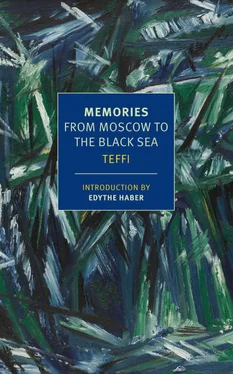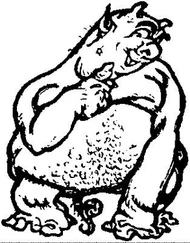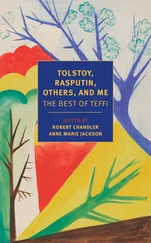Anastas’ia Chebotarevskaia, “Teffi. ‘I stalo tak…’,” Novaia zhizn’ , July, 1912 (no. 7): 255.
I. V[asilev]ski, “ ’Nichego podobnogo’. Novaia kniga Teffi,” Zhurnal zhurnalov , 1915, no. 10: 20; Ark[adii] Bukhov, “Teffi,” Zhurnal zhurnalov , 1915, no. 14: 17.
“Srednii,” Novyi Satirikon , Apr. 2, 1917 (no. 13): 6.
“Dezertiry!” Russkoe slovo , June 15 (28), 1917 (no. 135?): 2; V strane , 22.
V strane , 24–25.
“Nemnozhko o Lenine,” Russkoe slovo , June 23, 1917 (no. 141): 1; V strane , 47, 48. For an English translation, see Tolstoy, Rasputin, Others, and Me (NYRB, 2016).
“Iz mertvogo goroda,” V strane , 149. Orig. pub. in Novoe slovo , Mar. 8 (21), 1918, no. 34.
Ibid., 151.
“Peterburg,” V strane , 171. Orig. pub. in Kievskaia mysl’ , Oct. 4 (17), 1918, no. 188.
“Letuchaia mysh’,” Rampa i zhizn’ , May 6 (19), 1918 (no. 20): 11.
“Khronika,” Teatr i iskusstvo , Jan. 7, 1918 (no. 1): 5.
“Peterburg,” 170.
“Gorodok (Khronika),” in Gorodok (Paris: Izd. N.P. Karbasnikova, 1927), 5.
Ibid., 6.
“Ot avtora,” Vospominaniia (Paris: Vozrozhdenie, 1931, 5. Memories was first serialized in the newspaper, Vozrozhdenie between 1928 and 1930.
M. Tsetlin, “N. A. Teffi. Vospominaniia ,” Sovremennye zapiski , 1932, no. 48: 482.
“Baba–Yaga,” Novosel’e , June 1947 (no. 33–34): 29–37. Repr. in Teffi’s last book, Zemnaya raduga (NY: Chekhov Press, 1952), 264–68. Translated by Robert and Elizabeth Chandler in Russian Magic Tales from Pushkin to Platonov , ed. Robert Chandler (Penguin, 2012), 213–17.
“Tot svet,” “N. A. Teffi v gazete ‘Russkie novosti’ (1945–1947),” ed. E. G. Domogatskaia, in Tvorchestvo N. A. Teffi i russkii literaturnyi protsess pervoi poloviny XX veka , ed. O. N. Mikhailov, D. D. Nikolaev, E. M. Trubilova (Moscow: Nasledie, 1999): 214. Orig. pub. in Russkie novosti , Aug. 3, 1945 (no. 12): 4.
The Russian Word was a liberal Moscow daily newspaper, eventually closed down by the Bolsheviks. See Introduction, p. x.
Arkady Averchenko (1881–1925), a comic writer and playwright, founded two journals, Satirikon (1908–1913) and New Satirikon (1913–1918), to which Teffi contributed regularly.
Fatback ( salo )—the layer of hard fat under the skin of a pig’s back—is considered a delicacy in many parts of eastern Europe. Fatback, onion, and horilka (the Ukrainian equivalent of vodka) is a classic Ukrainian dish.
Some of these names sound Russian, some Jewish, some German, but none sound Ukrainian. All sound funny. “Koka” is a vulgar form of “krestnaya” (godmother); “Pupin” evokes the Russian word for the belly button; “Fik” and “Shpruk,” especially in the plural, sound equally odd.
The Bat was a theater-cabaret in Moscow, founded in 1908 by actors from the Moscow Arts Theatre. It closed in 1920 but later reopened in Paris.
Cléo de Mérode (1875–1966) was a French dancer of the Belle Époque. Born to a Belgian family of nobility, she made her professional debut at the age of eleven. Postcards and playing cards bore pictures of her, and one of her hairstyles became hugely popular.
Torquato Tasso (1544–1595) was an Italian poet.
Lolo was the nickname of Leonid Munstein (1866–1947), a poet, satirist, critic, and editor. A friend of Teffi, he too emigrated to France via Kiev, Odessa, and Constantinople. The operetta, with music borrowed from Offenbach, was produced in Moscow in August 1918.
The Ancient Theatre, co-founded by Nikolay Yevreinov (1879–1953) and Baron Drizen (1868–1935), with the philosophy of “artistic historic reconstruction,” played just two seasons, 1907–1908 and 1911–1912. The singer Bella Kaza-Roza (1885–1929) was a friend of Teffi; her repertoire included settings of poems by Teffi.
Silva (known in English as The Riviera Girl or The Gipsy Princess ), an operetta by the Hungarian composer Emmerich Kalman (1882–1953), was premiered in Vienna in November 1915. It remains popular in Hungary, Austria, and Germany and was made into a successful film in the Soviet Union.
Valery Bryusov was one of the founders of Russian Symbolism. Always an influential figure, he joined the Communist Party in 1920. There are several accounts of his abusing his position in the Soviet cultural apparatus to attack more gifted colleagues.
This three-headed dragon appears in one of the most famous Russian byliny or heroic songs.
The Soviet security services were originally called the “Extraordinary Committee” or Cherezvychainy komitet , usually shortened to Cherezvychaika or Cheka . Later acronyms were the OGPU, the NKVD, and the KGB.
“Vova” is an affectionate form of the name “Vladimir.” The intentionally ludicrous implication is that Fedosya received this shawl and portrait as a gift from Lenin himself.
Savely Schleifer (1881–1943). Born in Odessa, Schleifer studied there and in Petersburg. After living in Paris from 1905 to 1907, he returned to Petersburg. He taught there after the revolution but emigrated to Paris in 1927. Arrested by the Nazis soon after the outbreak of World War II, he died in Auschwitz.
Lydia Yavorskaya (1871–1921) was a well-known actress.
From “The Tryst” (1841) by Mikhail Lermontov.
After the October Revolution, Moisey Uritsky (1873–1918) was appointed head of the Petrograd Cheka (i.e. security police). On 17 August 1918 he was assassinated by Leonid Kannegisser, a poet and former military cadet. Soon after this, and after an attempt on Lenin’s life, the Bolsheviks initiated the wave of arrests and executions known as the Red Terror. Kannegisser was executed in October 1918. Ironically, Uritsky had been one of the few important Bolsheviks to disagree with Lenin about the need to resort to terror. See Ivan Bunin, Cursed Days , ed. Thomas Gaiton Marullo (Phoenix Press, 2000), p. 216, note 9.
This conversation is condensed from “Repentant Fate,” first published in 1913 and included in the collection Smoke without Fire (1914). In the story the actress assures Teffi that she would gladly help Teffi’s unfortunate protagonist by giving him money of her own, if only she could. Teffi returns to this theme—the artist as an “imitator of God”—in the last pages of Memories .
Читать дальше












